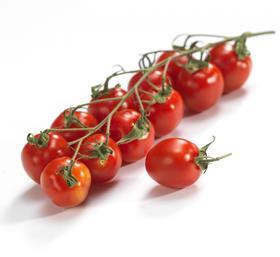
The saying goes that good things come in small packages and when it comes to tomatoes more and more British shoppers seem to agree.
Sales of small cocktail varieties are driving sales in the category, with baby plum tomatoes seeing the strongest growth, but this is not the only trend emerging – colour is also becoming a major selling point.
“We’re seeing a continuing trend in the demand at retail for pack formats that mix colours and sizes of tomatoes,” says Thanet Earth MD Des Kingsley. Mixes of yellow, orange and red tomatoes are now available at several of the major retailers and sales are booming, with 39 per cent value growth in the 52 weeks to 23 April, according to Kantar Worldpanel.
Sales of ordinary round tomatoes still outstrip those of other types, but smaller varieties are catching up. While round tomatoes have suffered a sales decline of 14.7 per cent to £159.6m in the past four years, baby plum tomatoes have enjoyed a 38.3 per cent increase to £118.5m since 23 April 2014.
Several growers are now reducing their plantings of round tomatoes, according to Reynolds’ Andy Weir, with production moving towards speciality fruit, particularly cocktail varieties. “Much of this change is being driven by the retail sector,” he says; while in foodservice sales of heritage tomatoes continue to grow. Despite their success in the restaurant sector, these heritage varieties must be showcased to justify their additional cost, Weir says – “they don’t lend themselves well to all dishes.”
Overall, demand for British tomatoes is buoyant, with demand continuing to outstrip UK supply and necessitate large Dutch and Spanish imports. Provenance is becoming increasingly important to British shoppers, however, and British branding is getting more prominent, Kingsley says.
Responding to this demand, Thanet Earth has begun the construction of a sixth glasshouse, to grow a mix of speciality tomatoes for British retailers. The glasshouse will add significant volume to the glasshouse complex’s annual production and having begun building work in March, Thanet Earth expects the facility to be operational later this year. “The additional capacity for UK tomatoes is very valuable to us,” said Kingsley, “particularly as the new glasshouse will also be lit and offer 12-month production.”
More generally, there continues to be significant investment in the British tomato industry, with companies spending tens of millions of pounds on new glasshouses, energy centres, LED lighting and other technologies in recent years. However, according to Dr Philip Morley of the British Tomato Growers’ Association (TGA), the most important investment to make is in personnel. “Making protected horticulture an attractive career for those with high academic, employment and financial aspirations is going to be very important, especially as we head towards Brexit,” he says. “We need to continue to replenish and replace expertise in tomato growing.”
If this happens, there is no reason why the market for speciality tomatoes can’t continue growing for many years to come.



